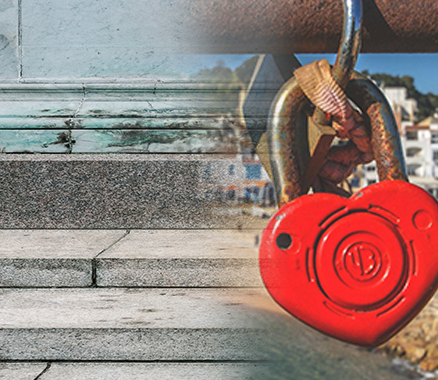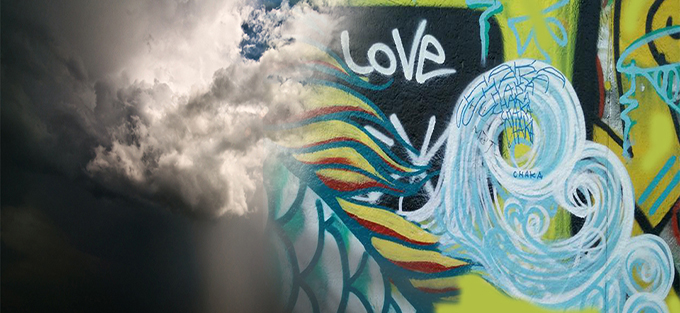by Meghan Johnston Aelabouni
A year into my first call as a youth and family pastor, a man named “Fred” started volunteering with our high school youth group. Fred was exuberant and charismatic. He showed up early, stayed late to clean up, and took vacation time to help lead the mission trip. Best of all, Fred formed an instant connection with our teens. He was not merely tolerated, but loved and deeply trusted. His enthusiasm for God and for life was infectious. In short, he was the perfect youth volunteer.
Then came the weekend of our high school winter retreat. Fred had signed up to help lead the trip, but for more than a week I had been unable to reach him by phone or email. I was concerned and a little annoyed. Fred was our only male adult leader; without him, we’d have to cancel the retreat and lose the deposit.
Finally, on the day of the trip, I drove over to his apartment. No one answered the door. Then I got the news that Fred was in the hospital. The cause, it turned out, was sitting on a table in the middle of Fred’s living room: an economy-sized bottle of vodka. Empty.
Fred was an alcoholic—something I had never suspected and would never have guessed. When I visited him in the hospital, Fred apologized, vowing never to let us down again. I had no experience with addiction, no idea what to say or do. I stumbled over my words, saying that I wasn’t sure how best to have him involved in the youth group, that we needed to make sure he was taking care of himself.
Difficult conversations
Eventually, Fred wrote me a long email telling me that he had decided to stop volunteering with the youth group to focus on his health. “Our youth are in good–no, great–hands with you,” he wrote.
I called him. Our conversation felt honest and uplifting. I invited him to come one last time to youth group for closure. I breathed a sigh of relief that things had been resolved so smoothly.
Except–they hadn’t.
Suddenly, parents and teens from the congregation began calling me. According to Fred, I had kicked him out of the youth group for drinking. Why had I felt the need to judge him? Why couldn’t I forgive him, as a Christian would? When I explained that it was Fred’s decision, one parent accused me outright of lying. Fred left the congregation soon after, but the damage had been done. The trust of our youth group–at least, the teens’ trust in me–had evaporated.
At home, I sobbed. But at church, when one sympathetic member asked if I was angry, I shook my head and denied it, claiming I was “just sad.” That wasn’t true: I was furious and devastated. But I was a pastor, and I thought that anger at a parishioner was an emotion I was not permitted to have. After all, wasn’t I supposed to love my neighbor, even my enemy, as myself?
Addiction was the enemy
 Of course, Fred was never my enemy–his addiction was. And his addiction was his own worst enemy, too, causing him far more pain than it ever did me. But I only understood that later, as I learned more about the ways addiction can overtake judgment and decision-making, encouraging people to do and say whatever allows them to continue drinking or using.
Of course, Fred was never my enemy–his addiction was. And his addiction was his own worst enemy, too, causing him far more pain than it ever did me. But I only understood that later, as I learned more about the ways addiction can overtake judgment and decision-making, encouraging people to do and say whatever allows them to continue drinking or using.
And I made a mistake, too. I believed that in order to love Fred, I couldn’t be angry at him. I ignored and denied my own feelings, and all the emotion I wouldn’t let myself admit wedged itself like a block of granite next to my heart. I felt it every time the teens complained about missing Fred (with an angry side-glance at me.) Every time I heard his name, I felt the heavy weight of failed love.
Time passed. I moved on, working to clear the air and rebuild trust with our youth group. Slowly, wounds started to heal, including mine. Fred’s friends told me he was doing better: looking into AA groups, staying sober, back at work. And then one Sunday morning, as I was serving communion, Fred was there. He came down the aisle, hands outstretched, a smile on his face. I held out the bread–“The body of Christ, given for you.” He nodded, took it, and walked back to his seat.
Sharing communion
Over the years, I have tried to remember if we talked that day. Sometimes I’m sure we had a conversation, however brief. Other times I think I’m wrong, that Fred quietly slipped out during the sending hymn. I don’t know which it was, but I do know it was the last time I saw him. Weeks later, my senior pastor called to tell me that Fred had fatally overdosed the night before.
Shocked and numb, I convened our youth group and their parents that night. We cried and prayed and agonized over what might have been. One parent, with professional experience in addiction and recovery work, gently told us that there was nothing we could have done–that Fred didn’t mean to do it, that it was just “one last night of drinking” that became his last.
Fred and I never got the chance to resolve the hurt between us. How I wish we had! But we did share communion. And here is the staggering, grace-filled gift of the church: No matter what was in our hearts or minds, despite the words that never passed our lips, the love of God connected us in that moment. And God’s love connects us forever in the communion of saints.
We are part of the same body of Christ–Christ who knew Fred’s failings and mine, Christ who died to free us from sin and addiction and death, Christ who brings us together as beloved children. And as Fred and I both live, still, in Christ’s eternal love, the same love holds us both. And maybe that’s enough.
Discussion questions:
1. Have you ever experienced a misunderstanding or conflict that seemed to take on a life of its own? What happened?
2. What role does vulnerability play in love? What role does health (physical, emotional, psychological, or spiritual) play in love?
3. What are some healthy ways a church community can support people struggling with addiction? Or what are some healthy ways a church community can work through conflict?
Closing prayer:
Lord of life, we know that you came into the world that we might have life, and have it abundantly. We pray for our neighbors and ourselves, for all the things that prevent us from sharing full and abundant life with you and with one another. For those struggling with addictions, those in recovery, and those who have lost their lives to addiction–and for those who love them–we pray for your grace. For our own broken relationships, we pray for your healing mercy. For ourselves, we pray for your Spirit, that we might open our hearts in courage and find that the truth will set us free. In Jesus’ name, we pray for all your beloved people. Amen.
Meghan Johnston Aelabouni is an ordained ELCA pastor and a doctoral student at the University of Denver/Iliff School of Theology. Meghan and her husband, Gabi, have three children and live in Colorado.
Photo used in collage from Unsplash.com, used with permission. Art by Elizabeth McBride.


I am particularly touched by this article as two of my best friends’ sons are struggling with alcohol addictions & “its fallout”! I am realizing that it is also the parents, spouses, siblings, & extended family who need “recovery” help, guidance.
Thank you for bearing your soul with this experience !